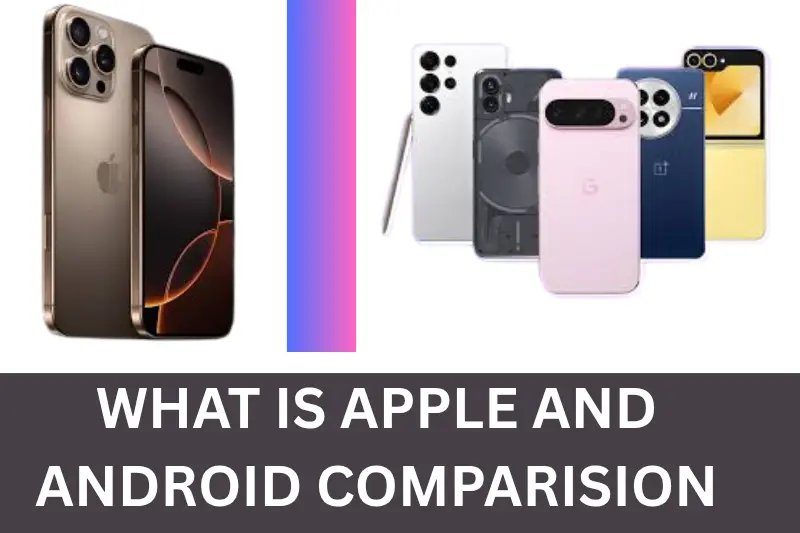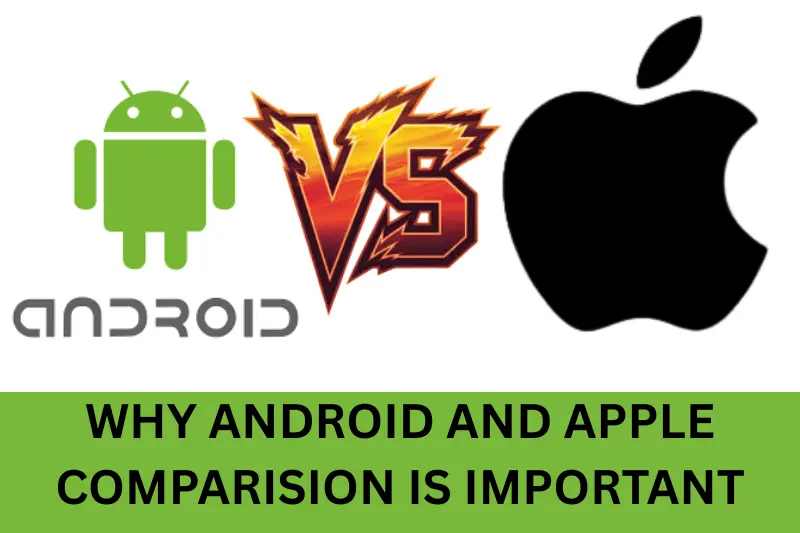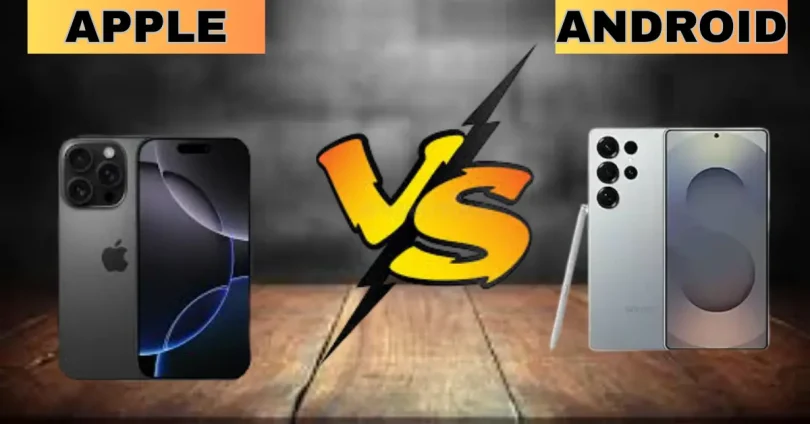Introduction:
When it comes to choosing a smartphone, the debate of Android vs iPhone comparison always comes up. Both offer amazing features, smart designs, and powerful performance, but they’re very different in how they work. Some people love Android because of its custom options and wide variety of brands. Others prefer iPhones for their smooth performance and strong security.
In this Android vs iPhone comparison, we’ll help you understand the key differences so you can decide which one fits your needs better. Whether you care more about price, apps, camera, or design—this guide will make things simple and clear for you.
What is “Android vs iPhone Comparison?”

The term Android vs iPhone comparison simply means looking at the major differences and similarities between Android phones and iPhones. It’s a way to understand how each platform performs in areas like:
- User Interface
- Customization
- App availability
- Security and privacy
- Device variety
- Price and value
- Software updates
- Camera quality
This comparison helps users decide which phone is better for them based on their personal needs and preferences. While Android is used by many phone brands (like Samsung, Xiaomi, and OnePlus), iPhone is made only by Apple. Each has its own strengths, and the comparison shows which one might be the right choice for you.
Why is “Android vs iPhone Comparison” Important?

Understanding the Android vs iPhone comparison is important because it helps users make better decisions when choosing a smartphone. Each platform has its own strengths, and knowing the differences can help you find the best fit for your needs.
Helps You Choose the Right Device
- Everyone uses their phone differently—some need better cameras, others want faster performance or more storage.
- This comparison highlights the key features of both platforms.
Helps You Manage Your Budget
- iPhones are generally more expensive.
- Android phones offer a wider range of prices, from budget to premium.
- Knowing what each offers helps you get the best value for your money.
Improves Security Awareness
- iPhones are known for strong privacy and security features.
- Android gives more control and flexibility but varies by brand.
- The comparison shows which system better protects your data.
Shows Customization Options
- Android allows more freedom to change the look and feel of your phone.
- iPhones focus on simplicity and consistent design.
- This helps users decide which experience they prefer.
Camera and App Performance
- Some Android phones offer high-end camera systems.
- iPhones are praised for consistent photo and video quality.
- The comparison helps photography and app lovers choose wisely.
Software and Updates
- Apple provides regular software updates to all iPhones.
- Android updates depend on the brand and model, which can delay updates.
- Understanding this helps you pick a phone that stays up to date longer.
Ecosystem Compatibility
- iPhones work well with other Apple products like MacBooks and Apple Watches.
- Android devices may not connect as smoothly across different brands.
- Important if you use multiple devices daily.
Step-by-Step Guide on Android vs iPhone Comparison
Here is a simple and clear step-by-step guide to help you compare Android vs iPhone and choose the right phone for your needs.
Step 1: Understand the Operating System
- Android: Open-source system used by many brands like Samsung, Xiaomi, and OnePlus. Offers more customization.
- iPhone (iOS): Apple’s own system, known for simplicity, speed, and better privacy features.
Step 2: Compare Device Variety
- Android: Offers many models with different sizes, designs, and features.
- iPhone: Limited models (usually 3–4 per year), but all are premium in build and performance.
Step 3: Check the User Interface
- Android: Highly customizable—change themes, widgets, launchers.
- iPhone: Clean, simple, and consistent interface, but less room for personalization.
Step 4: Compare Price Ranges
- Android: From budget-friendly to ultra-premium devices.
- iPhone: Mostly premium-priced with few budget options (like older models or iPhone SE).
Step 5: Look at App Store and App Performance
- Android: Google Play Store offers a wide range of apps, including some free or experimental ones.
- iPhone: Apple App Store has stricter controls, resulting in higher quality and more secure apps.
Step 6: Evaluate Camera and Multimedia
- Android: Some phones (like Samsung Galaxy S series or Google Pixel) offer advanced camera features.
- iPhone: Delivers consistently high camera performance, especially in video recording.
Step 7: Check Software Updates
- Android: Updates vary by brand. Google Pixel gets updates quickly; others may delay.
- iPhone: All devices get the latest iOS updates at the same time for several years.
Step 8: Assess Battery Life and Charging
- Android: Many models offer fast charging, large batteries, and even reverse charging.
- iPhone: Reliable battery but slower charging unless using higher-end chargers.
Step 9: Think About Ecosystem and Device Sync
- Android: Syncs well with Google services and various devices, but not always seamlessly.
- iPhone: Works best within the Apple ecosystem (Mac, iPad, Apple Watch) with smooth integration.
Step 10: Decide Based on Your Needs
- Choose Android if you want variety, customization, or a device that fits your budget.
- Choose iPhone if you value simplicity, software support, and a secure, consistent experience.
Advantages and Disadvantages of Android vs iPhone Comparison
Here is a simple breakdown of the advantages and disadvantages of Android and iPhone without using a table:
Android – Advantages
- Offers a wide variety of devices from different brands
- Available in all price ranges, from budget to premium
- Highly customizable interface and features
- Many models come with fast charging and large battery capacity
- Open system with flexible app options and file sharing
- Some Android phones have advanced camera technology
- Easy access to Google services and apps
- Expandable storage in many models
Android – Disadvantages
- Software updates can be delayed depending on the brand
- App quality can vary due to less strict store policies
- Some low-cost models may have weaker performance or features
- Security may not be as strong as iPhone across all devices
- User experience differs between brands
iPhone – Advantages
- Clean, smooth, and consistent user experience
- Regular and long-term software updates for all supported models
- High-quality apps due to strict App Store rules
- Strong security and privacy controls
- Excellent camera and video performance
- Seamless integration with Apple devices (Mac, iPad, Apple Watch)
- Better resale value over time
- Stable performance even on older models
iPhone – Disadvantages
- Expensive compared to most Android devices
- Limited customization options
- No external storage or memory card support
- Works best only with other Apple products
- Limited variety in models and features
Common FAQs on Android vs iPhone Comparison
Which is better: Android or iPhone?
It depends on your needs. Android offers more variety and customization. iPhone is known for security, updates, and smooth performance.
Are Android phones cheaper than iPhones?
Yes, Android phones are available in all price ranges, while iPhones are generally more expensive.
Which one is safer: Android or iPhone?
iPhones are considered more secure because of Apple’s strict privacy controls and regular updates.
Can I transfer my data from Android to iPhone?
Yes, you can. Apple offers a “Move to iOS” app to help transfer contacts, photos, and messages.
Do Android phones get regular updates like iPhones?
Not always. Some Android phones get updates quickly (like Google Pixel), but others may delay or skip updates.
Which phone has a better camera: Android or iPhone?
Both offer great cameras. High-end Android phones like Samsung and Pixel have excellent cameras. iPhones are known for consistent and reliable camera performance.
Can I customize an iPhone like an Android phone?
Not much. iPhones have a simple and fixed interface. Android allows you to change themes, icons, and more.
Which phone is easier to use?
Most people find iPhones easier to use because of their clean design. But Android is also user-friendly and offers more control.
Is it easy to switch from iPhone to Android?
Yes, it’s possible. There are tools and apps that help you move your data safely and quickly.
Which one lasts longer: Android or iPhone?
iPhones generally last longer in terms of software support and resale value. But a good Android phone can also last many years with care.
Conclusion
In the end, the Android vs iPhone comparison comes down to your personal needs and preferences. If you want more choices, flexibility, and a range of prices, Android is a great option. If you prefer a simple, secure, and smooth experience with regular updates, iPhone is a solid choice.
Bonus Points on Android vs iPhone Comparison
Here are some extra tips to help you decide better in the Android vs iPhone comparison:
- Resale Value: iPhones usually have higher resale value compared to Android phones.
- Customer Support: Apple offers strong customer support through Apple Stores and online services.
- App Quality: Many apps are released first or perform better on iPhones.
- Expandable Storage: Most Android phones allow microSD cards; iPhones do not.
- Charging Port: Android uses USB-C (faster and more common), while iPhones use Lightning (but USB-C started in newer models).
- Dual SIM Support: Many Android phones support dual SIMs; only some iPhone models do.
- File Sharing: Android allows easier file sharing between devices. iPhone has AirDrop for quick Apple-to-Apple sharing.
- Innovation: Android brands often bring new features (like foldable screens) before Apple does.




